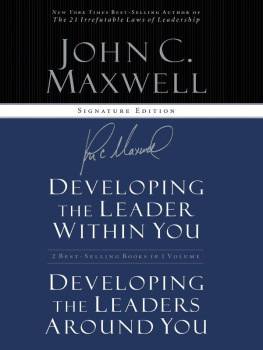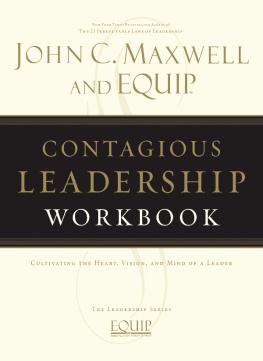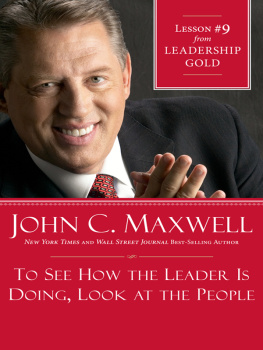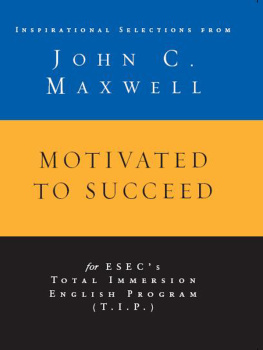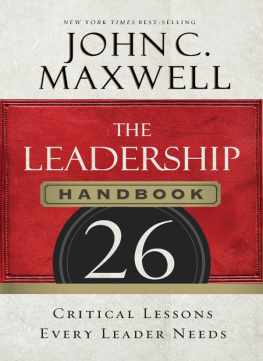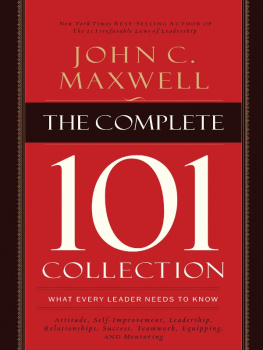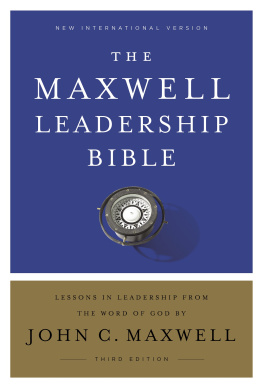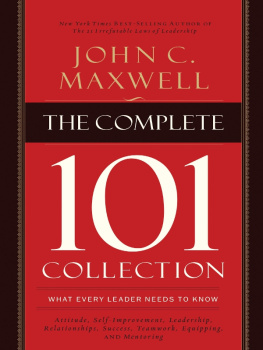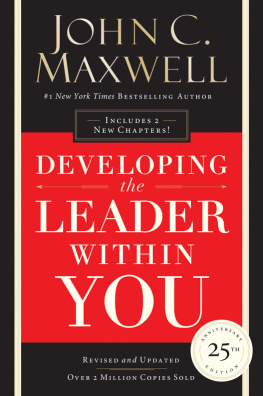RELATIONSHIPS
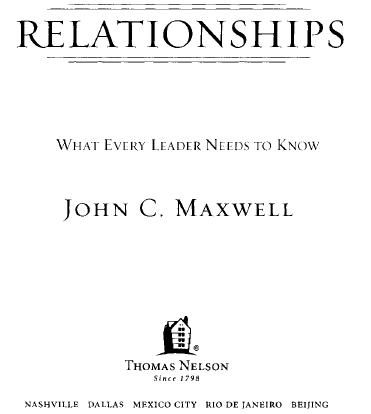
2003 by Maxwell Motivation, Inc., a Georgia Corporation
All rights reserved. No portion of this book may be reproduced, stored in a retrieval system, or transmitted in any form or by any meanselectronic, mechanical, photocopy, recording, scanning, or otherexcept for brief quotations in critical reviews or articles, without the prior written permission of the author.
Published in Nashville, Tennessee, by Thomas Nelson.
Thomas Nelson is a registered trademark of Thomas Nelson, Inc.
Published in association with Yates & Yates, www.yates2.com
Scripture quotations noted NIV are from the HOLY BIBLE: NEW INTERNATIONAL VERSION. 1973, 1978, 1984 by International Bible Society. Used by permission of Zondervan Publishing House. All rights reserved.
Portions of this book were previously published in Becoming a Person of Influence,
The 17 Essential Qualities of a Team Player, The 21 Irrefutable Laws of Leadership,
The 21 Indispensable Qualities of a Leader, and Your Road Map for Success.
Library of Congress Cataloging-in-Publication Data
Maxwell, John C., 1947
Relationships 101 : what every leader needs to know / John C. Maxwell,
p. cm.
"Portions of this book were previously published in Becoming a person of influence,
The 17 essential qualities of a team player, The 21 irrefutable laws of leadership,
The 21 indispensable qualities of a leader, and Your road map for success."
ISBN: 978-0-7852-6351-7 (hardcover)
1. Leadership. 2. Interpersonal relations. 3. Success in business.
I. Title.
HD57.7 .M39427
658.4'092dc22
2003021381
Printed in the United States of America
09 10 11 12 WOR 20 19 18
CONTENTS
No one undertakes a journey alone. We depend upon others constantlyin ways both tangible and intangibleto move us toward our destination. We cannot succeed without the help of others, but forming positive relationships can be a challenge. In Relationships 101, John Maxwell reveals the secrets behind connecting with other people. He points out the barriers to relationships, emphasizes the shared needs among people, and describes the ways to connect with others on many different levels. Naturally, he also shows how relationships impact leadership. Most of all, he explains how relationships help us reach our fullest potential.
As Americas leadership expert, Dr. Maxwell has spent a lifetime helping others become successful. Through this series of books, his goal is to help others become a REAL success in four crucial areas: Relationships, Equipping, Attitude, and Leadership. Relationships 101 provides the fundamentals you need to master relationship skills. Equipping 101, Attitude101, and Leadership 101 will give you the other skills you need to reach your goals.
We are delighted to publish Relationships 101 because we recognize the significance of positive relationships in every aspect of life. Building positive relationships with others involves risk, but Dr. Maxwell shows that the rewards outweigh that risk. This short course on relationships will equip you with valuable skills for connecting with others as you journey toward success.
THE NATURE
OF RELATIONSHIPS
WHY ARE RELATIONSHIPS
IMPORTANT TO SUCCESS?
Relationships are the glue that holds team members together.
In the early 1960s, Michael Deaver was a young man with a political bent looking for a leader he could believe in and follow. The person he found was an actor-turned-politician named Ronald Reagan. In 1966, Reagan was elected governor of California, an office he would hold for two terms, from 1967 to 1975. During that tenure, Deaver became Reagan's deputy chief of staff, an office he also held when Reagan became the nation's fortieth president.
Deaver admired many things about the man he worked with for thirty years: his convictions and love of country, his understanding of himself, his skill as a communicator, and his honesty. Deaver said, "I would go so far as to say that he was actually incapable of dishonesty." But perhaps what was most impressive about Ronald Reagan was his ability to relate to people.
Deaver commented, "Ronald Reagan was one of the shyest men I'd ever met."
Part of Reagan's skill came from his natural charisma and glib verbal aptitude developed in Hollywood. But even greater was his ability to relate to people, something he honed while traveling the country for a decade as the spokesman for General Electric.
It's said that Reagan could make anyone feel like his best friend, even someone he'd never met before. But more important, he connected with the people closest to him. He truly cared about the people on his team. "The chief of staff, or the gardener, or a secretary would all be treated the same, as far as he was concerned," remembered Deaver. "They were all important."
Deaver related a story that tells much about the connection the two men experienced. In 1975, Reagan gave a speech to a group of conservation-minded hunters in San Francisco, and the organization gave him a small bronze lion as a gift. At the time, Deaver admired it and told Governor Reagan how beautiful he thought it was.
Ten years later, Deaver prepared to bring his service to President Reagan to an end after having written his letter of resignation. Reagan asked Deaver to come to the Oval Office the next morning. As the deputy chief of staff entered the room, the president stood in front of his desk to greet him.
"Mike," he said, "all night I've been trying to think of something to give you that would be a reminder of all the great times we had together." Then Reagan turned around and picked up something from his desk. "You kinda liked this little thing, as I recall," the president said, his eyes moist. And he handed the bronze lion to Deaver, who was totally overcome. He couldn't believe that Reagan had remembered that about him all those years. That lion has held a place of honor in Deaver's home ever since.
SOLID RELATIONSHIPS
Everyone liked being around Ronald Reagan because he loved people and connected with them. He understood that relationships were the glue that held his team members togetherthe more solid the relationships, the more cohesive his team.
Just about everything you do depends on teamwork. It doesn't matter whether you are a leader or follower, coach or player, teacher or student, parent or child, CEO or nonprofit worker; you will be involved with other people. The question is, will your involvement with others be successful? Your best chance for leadership also depends upon connecting with those on your team. Here is how you know whether you have built solid relationships with others. Look for the following five characteristics in your relationships:
1. RESPECT
When it comes to relationships, everything begins with respect, with the desire to place value on other people. Human relations author Les Giblin said, "You can't make the other fellow feel important in your presence if you secretly feel that he is a nobody."
The thing about respect is that you should show it to others, even before they have done anything to warrant it, simply because they are human beings. But at the same time, you should always expect to have to earn it from others. And the place you earn it the quickest is on difficult ground.
2. SHARED EXPERIENCES
Respect can lay the foundation for a good relationship, but it alone is not enough. You can't be relational with someone you don't know. It requires shared experiences over time. And that's not always easy to achieve. For example, right after Brian Billick, coach of the Baltimore Ravens, won the 2001 Super Bowl, he was asked about the team's chances for repeating a championship season. He commented that it would be very difficult. Why? Because 25 to 30 percent of the team changes every year. Newer players don't have the shared experiences with the team that are needed to succeed.
Next page
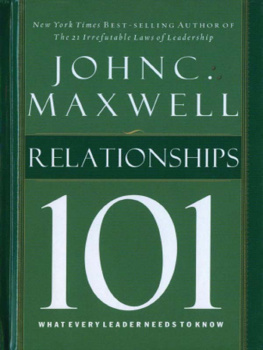

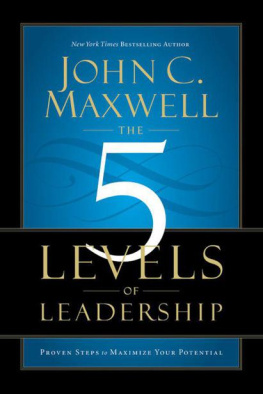

![Maxwell - The 360 [-degree] leader: developing your influence from anywhere in the organization](/uploads/posts/book/218782/thumbs/maxwell-the-360-degree-leader-developing-your.jpg)
